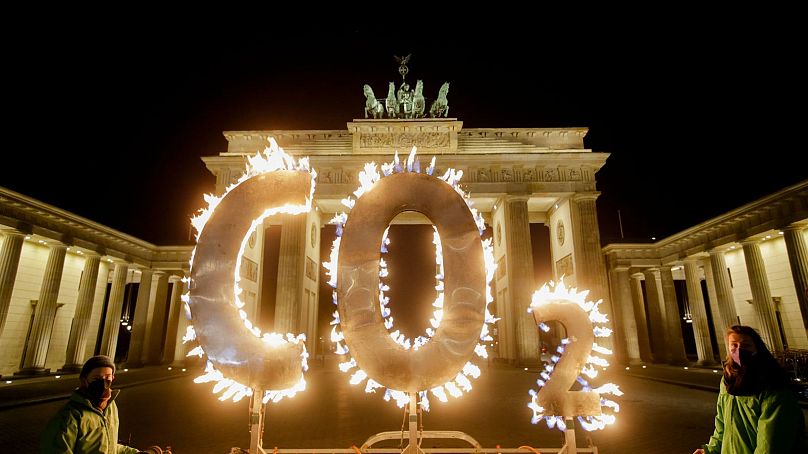There are fears the untested technology could stoke geopolitical tensions or be used by a rogue billionaire.
Switzerland’s attempt to explore the possibility of dimming the sun has been dismissed by a United Nations summit this week.
 ADVERTISEMENT
ADVERTISEMENT
 ADVERTISEMENT
ADVERTISEMENT
Solar geoengineering will go no further after a debate at the UN Environment Assembly (UNEA) in Kenya failed to reach a consensus on the issue last night.
Switzerland had suggested creating a UN expert group to study the “risks and opportunities” of solar radiation modification (SRM), a controversial set of technologies aimed at cooling the Earth.
But the European country withdrew its draft resolution in the face of strong opposition from other nations.
What is solar geoengineering and why is it so controversial?
Solar geoengineering, otherwise known as SRM, is an umbrella of largely untested technologies intended to tackle global heating.
It sounds like something straight off the page of a science fiction (or cli-fi) novel. But the big idea is to use aeroplanes to inject aerosols into the stratosphere which will reflect a small amount of sunlight back into space.
Similar to when volcanoes erupt and pump out aerosols, the hope is that SRM will lead to measurable cooling. Despite its potential, critics are alarmed by the unknown impacts of such drastic planetary action.
Releasing a report on the state of SRM research last year, the United Nations Environment Programme (UNEP) said it was “deeply concerned about the lack of empirical knowledge on the potential risk, impacts and unintended consequences.”
One worrying scenario is a rogue state or billionaire deciding to give it a go without the backing of the international community. Some people feel that even contemplating SRM research could flare up geopolitical tensions.
Others argue that investing in the technical ‘fix’ will take the pressure off governments and fossil fuel companies to decarbonise.
But one thing we need to be “crystal clear” about, says UNEP’s chief scientist Andrea Hinwood, is that SRM technologies are not a solution to the climate crisis. They do not reduce greenhouse gas emissions nor could they reverse the impacts of climate change, she has explained.
Ocean acidification, sea level rise, increasingly extreme weather, pollution and other issues will all continue unless they are tackled at source.
There are also concerns about the impact of SRM on food supply and biodiversity. And what would happen if Stratospheric Aerosol Injection (SAI) suddenly stopped in the future - releasing the previously cloaked impacts of warming.
Should we be talking about solar geoengineering?
Perhaps the most relevant part of the solar geoengineering debate for now is whether we should be talking about it at all.
Critics have likened it to opening a ‘Pandora’s box’ of irreversible trouble, and say setting up an expert group on the subject could undermine the de facto moratorium on geoengineering.
“The vocal opposition to geoengineering at UNEA-6 sends a powerful message underscoring a broad commitment to upholding established norms of international environmental law,” says Mary Church, senior geoengineering campaigner at the Center for International Environmental Law (CIEL).
“Solar radiation modification technologies are dangerous and do not have any role to play in our common future,” she reaffirmed in response to the news from Nairobi.
UNEP appears more even-handed. Since SRM research has been underway for decades, Dr Hinwood said, “it is naive to think research will cease and the issues will disappear. We cannot afford to bury our heads in the sand.”
What did countries decide on solar geoengineering at the UNEA?
Switzerland withdrew its draft resolution on SRM at the sixth UN Environment Assembly after countries were unable to agree on it.
The draft called for a panel of experts appointed by member states of UNEP and representatives of international scientific bodies. It was reportedly supported by Monaco, Georgia and Israel.
“We regret that UNEA couldn’t come to a conclusion on this important matter,” a spokesperson for Switzerland’s Federal Office for the Environment tells Euronews Green. “However, the discussions have been informative and useful and we managed to start a global conversation about this important topic.”
The spokesman said that while there was a “general acknowledgement” that more research and better access to information is needed, views diverged on how best to achieve that. Countries were also divided on whether the focus should be exclusively on risks and uncertainties of SRM or extend to the potential benefits too.
“[A]ttempts to legitimise SRM technologies were met by strong resistance, with Pacific Island States, Colombia, Mexico, and the EU supporting the African Group’s leadership against attempts to normalise these unproven technologies,” CIEL’s Church says.
The organisation also criticised actions by the US, Saudi Arabia and Japan, which it claims tried to welcome geoengineering advocates and undermine existing UN government structures.
When Switzerland previously proposed global oversight of geoengineering at the UNEA in 2019, the US and Saudi Arabia were accused of blocking the topic in order to pursue independent research.
Providing another perspective on the outcome of Switzerland’s latest effort, the Alliance for Just Deliberation on Solar Geoengineering (DSG) said it was “encouraging to see a willingness to engage” from a wide set of member states.
“We know these are hard conversations with a long road ahead, and it is clear that there is still a need for improved access to science-based information around SRM, engagement from other stakeholders, and time to develop perspectives for future decision-making processes,” DSG founder and executive director Dr Shuchi Talati tells Euronews Green from Nairobi.
“SRM research and governance discussions will continue to grow, and we're pleased to see intergovernmental organisations starting to address this critical issue."



















